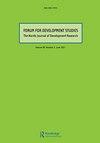The ‘Problem Represented To Be’ in the Social Protection Policy Regimes of Ethiopia
IF 1.1
Q3 DEVELOPMENT STUDIES
引用次数: 2
Abstract
Abstract Policy analysis needs to go beyond the conventional ‘problem solving’ approach to interrogating ‘problem representations’ within policy documents. Numerous studies on social protection in Ethiopia, and in sub-Saharan Africa at large have been confined to studying the impact of policy interventions. Studies that aimed to scrutinize policy documents for their ‘problematization’ of issues and ‘problem representations’ in the Foucauldian sense are in dearth. This study used document analysis as a method and Bacchi’s (2009a) ‘What is the Problem Represented to be’ (WPR) model as its analytic frame to interrogate the ‘problem representations’ of the Developmental Social Welfare Policy (DSWP) and the present Social Protection Policy of Ethiopia. The findings suggest that though there is improvement from the earlier to the current policy, ‘problem representations’ of both were limited in terms of what they could deliver, for they were framed by targeting theory, having the ‘resource scarcity’ excuse. This was mainly reflected in the policy regimes’ ‘problematization’ of issues and ‘subjectification’ of beneficiaries.埃塞俄比亚社会保护政策制度中的“问题代表”
政策分析需要超越传统的“解决问题”的方法,在政策文件中询问“问题表征”。关于埃塞俄比亚和整个撒哈拉以南非洲的社会保护的许多研究都局限于研究政策干预的影响。旨在仔细审查政策文件中问题的“问题化”和福柯式意义上的“问题表征”的研究很少。本研究以文献分析为方法,以Bacchi (2009a)的“问题代表是什么”(WPR)模型为分析框架,对埃塞俄比亚发展社会福利政策(DSWP)和现行社会保护政策的“问题代表”进行了探讨。研究结果表明,尽管从早期的政策到目前的政策有了改进,但两者的“问题表征”在能够提供的内容方面是有限的,因为它们是由目标理论构建的,有“资源稀缺”的借口。这主要反映在政策制度对问题的“问题化”和受益者的“主体化”。
本文章由计算机程序翻译,如有差异,请以英文原文为准。
求助全文
约1分钟内获得全文
求助全文
来源期刊

FORUM FOR DEVELOPMENT STUDIES
DEVELOPMENT STUDIES-
CiteScore
1.80
自引率
14.30%
发文量
24
期刊介绍:
Forum for Development Studies was established in 1974, and soon became the leading Norwegian journal for development research. While this position has been consolidated, Forum has gradually become an international journal, with its main constituency in the Nordic countries. The journal is owned by the Norwegian Institute of International Affairs (NUPI) and the Norwegian Association for Development Research. Forum aims to be a platform for development research broadly defined – including the social sciences, economics, history and law. All articles are double-blind peer-reviewed. In order to maintain the journal as a meeting place for different disciplines, we encourage authors to communicate across disciplinary boundaries. Contributions that limit the use of exclusive terminology and frame the questions explored in ways that are accessible to the whole range of the Journal''s readership will be given priority.
 求助内容:
求助内容: 应助结果提醒方式:
应助结果提醒方式:


